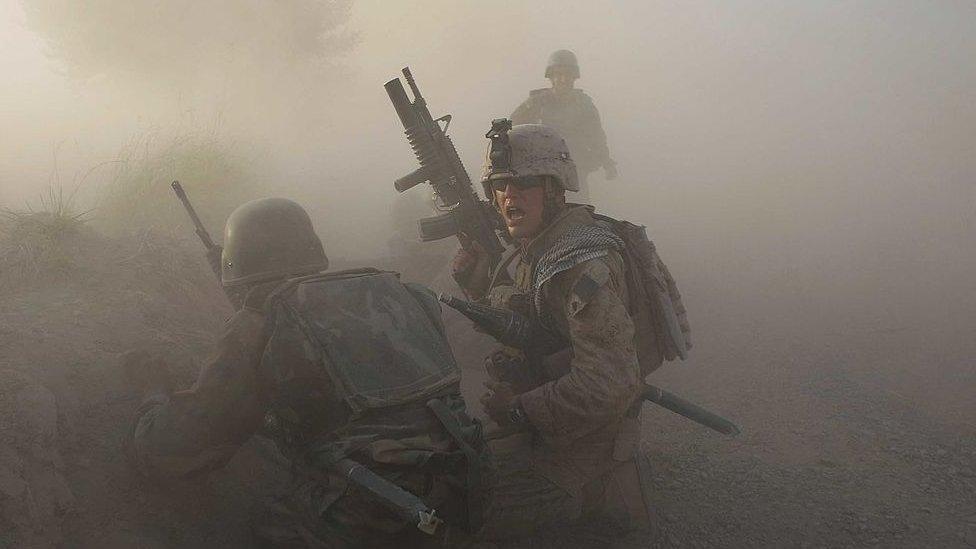Afghanistan war: US spies doubt reports of Russian 'bounties' for troops
- Published

The White House has acknowledged there was little evidence that Russia had offered Taliban militants bounties to kill US soldiers in Afghanistan.
A spokeswoman for President Joe Biden said the claim had "low to moderate confidence" from US spy chiefs.
Russia has denied paying the bounties. In last year's US election, Mr Biden heavily criticised Donald Trump for not confronting Russia over the claim.
It comes amid new sanctions on Russia and US plans to leave Afghanistan.
The intelligence assessment was first reported last June by the New York Times, and was cited by Mr Biden on the 2020 presidential campaign trail to accuse then-President Trump of not standing up to Russia.
Mr Trump at the time called it "fake news" and a "fake issue". He later tweeted that he was not briefed on the subject because US intelligence agents had not deemed it credible.
At a White House news briefing on Thursday, Press Secretary Jen Psaki told reporters the intelligence community had determined it had "low to moderate confidence" in the claims.
She said this was due to the fact that the information was said to have come from interrogations of Afghan detainees.
"It's challenging to gather this intelligence and this data," she said.
"While there is low-to-moderate assessment in these reports, we felt it was important for our intelligence community to look into it."
When it emerged last year, the news caused a political furore in the US Congress. Mr Biden repeatedly used the report to criticise Mr Trump's leadership.
"His entire presidency has been a gift to Putin, but this is beyond the pale," Mr Biden said of his Republican opponent shortly after the news broke.
"It's a betrayal of the most sacred duty we bear as a nation to protect and equip our troops when we send them into harm's way. It's a betrayal of every single American family with a loved one serving in Afghanistan or anywhere overseas."
Mr Biden brought it up again during his speech to accept his party's nomination at the National Democratic Convention and in his first conversation as president with Russian President Vladimir Putin.

A cautionary tale

In the heat of last year's presidential campaign, reports of Russian bounties being paid for killing US troops in Afghanistan quickly became a new line of attack against Donald Trump.
Democrats cited the reports - based on anonymous information provided by US intelligence sources - as yet further evidence that the then-president was soft on Russia, willing to turn a blind eye to Vladimir Putin's transgressions even at the cost of American blood.
Joe Biden brought it up during one of the presidential debates. Barack Obama mentioned it in a campaign speech, accusing Trump of being "missing in action" as commander-in-chief.
It turns out the "evidence" behind those reports is thin - "low to moderate confidence," in intelligence-speak. And this week the Biden administration indicated it isn't willing to use it as the basis for further sanctions against the Russian government. All Putin got from Biden on the matter this year was a warning.
The original coverage of the bounties story included acknowledgment of nuance and uncertainty. Much of that was lost in the white-hot crucible of US politics, however.
These latest revelations should provide a cautionary tale: take anonymous reports, even when they come from official sources, with a healthy dose of salt.

No mention of the bounties came in Mr Biden's most recent phone call with Mr Putin on Tuesday, according to a White House summary of the call.
The White House statement comes as the US launches several new sanctions against Russia over what it describes as cyber-attacks and other hostile acts.
It also comes days after Mr Biden announced that the US will withdraw all troops remaining in Afghanistan by September 2021.